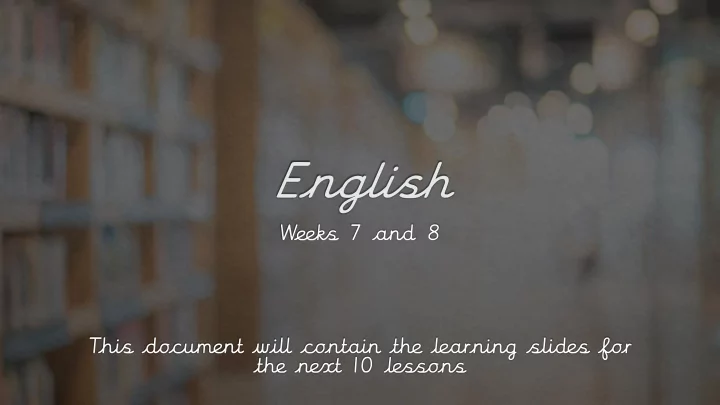

What is meant by ‘word class’? Here are some examples: Noun adjective verb Can you think of any more types of words?
Now complete activity 1
Use this to help complete activity 2
Now complete activity 2
To ‘uplevel’ a sentence is to make a boring sentence interesting by including more advanced grammatical features, such as changing... ‘The wolf guarded the babies.’ into ‘Curiously, the the calm, lm, nurturin turing g wolf, , who normally ally growled d at human mans, s, guar arde ded the e vulnera rable le, , aban andon oned d babie ies .’ How has this sentence been improved?
Fronted Expanded Noun Relative Adverbials Phrases Clauses Curious iously, y, the the calm, lm, nurt rturing uring wolf, , who o norm rmall lly y growle owled d at human ans, guarded the vulne nerable, rable, abandone doned d ba babi bies. Can you see how much more interesting this sentence has become now that we know some extra details?
Fronted adverbials are words or phrases at the beginning of a sentence which are used to describe the action that follows, such as: Without hesitation, Riyad reached up to grab the ball. Every evening, Maiya practises with her guitar. Cheekily, Liza smiled when she saw her cards.
An expanded noun phrase provides extra information about the noun. You can use adjectives or modifying nouns to give more information within your sentences, such as: some exciting holiday brochures a cute, pink pig the majestic, magical unicorn
A relative clause gives us extra information about the noun in the main clause. It is connected to the main clause by a relative pronoun . Examples are: The squirrel , which was half way up the tree, clung onto the trunk. Sebastian , who was previously undefeated, now stands in fourth place. The storm , that was predicted yesterday, almost capsized the boat.
Rec ecap ap Adverbs give us more information about: Verbs (action or doing words/to show • states of being) Adjectives (describing words) • Other adverbs • Whole clauses • Let’s explore how…
Rec ecap ap Adverbs give us more information about: Verbs (action or doing words/to show • states of being) Adjectives (describing words) • Other adverbs • Whole clauses • Let’s explore how…
Rec ecap ap Adverbs give us more information about: Verbs (action or doing words/to show • states of being) Adjectives (describing words) • Other adverbs • Whole clauses • Let’s explore how…
Rec ecap ap Adverbs give us more information about: Verbs (action or doing words/to show • states of being) Adjectives (describing words) • Other adverbs • Whole clauses • Let’s explore how…
The past tense explains something that has already happened (and finished happening)
Now complete Activity 6
Lesson 5 Formality
Now complete Activity 7
Lesson 6 Apostrophes
Lesson 6 Apostrophes
Lesson 6 Apostrophes
Lesson 6 Apostrophes
Lesson 6 Apostrophes
Lesson 6 Apostrophes
Lesson 6 Apostrophes
Lesson 6 Apostrophes
Lesson 6 Apostrophes
Lesson 6 Apostrophes
Lesson 6 Apostrophes
Lesson 6 Apostrophes
Lesson 6 Apostrophes
Lesson 6 Apostrophes
Lesson 6 Apostrophes
Lesson 6 Apostrophes
Lesson 6 Apostrophes
Lesson 6 Apostrophes
Now complete activity 8
Lesson 7 Inverted commas
Now complete Activity 9
Lesson 8 Inverted commas- continued
Recap yesterday’s slides
Can you remember all the rules for using inverted commas?
Complete activity 10
Recommend
More recommend